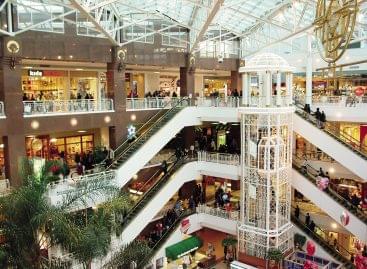Shared thinking, conscious renewal: the Hungarian retail real estate market has reached a turning point
The retail real estate market today is struggling with an economic slowdown, regulatory uncertainty and rapidly changing consumer demands, while sustainability, digitalization and tenant-landlord partnerships have never been more decisive. The main message of the Hungarian Shopping Centers Association’s event last week, which was attended by nearly 200 participants, is that the future of the sector is shaped by qualitative renewal, data-driven and sustainable operations and collaboration.

On November 17, the comprehensive professional conference of the Hungarian Shopping Centers Association (MBSZ) took place at the Crowne Plaza Budapest hotel with the participation of nearly two hundred professionals – leading players in the retail real estate market, investors, financiers, operators and tenants. The association was particularly pleased that the tenant side was represented in record numbers, which strongly indicates that all segments of the market want to participate as partners in discussing the current challenges and future directions. As Attila Prosits, President of the MBSZ, put it: “Our association does not represent an individual house, but the industry. We can only be successful if decisions are based on real dialogue and shared thinking.”
The presentations and roundtable discussions at the conference painted a clear picture of the current market situation: the retail real estate market is struggling with slowing economic growth, declining investments, regulatory uncertainty and rapid changes in consumer habits. According to macroeconomic analyses, Hungarian GDP growth is below the EU average, the investment rate has decreased from 27 percent to 20 percent within years, while household consumption is stable but cautious.
According to tenant reports, the commercial model is undergoing a radical transformation: cost pressures affect everyone, changes in the labor market require new structures, and the shopping habits of younger generations – especially the advancement of digital and self-service systems – are placing completely new expectations on shopping centers. The brands present clearly indicated that only partnership, flexibility and joint innovation can provide a real competitive advantage.
Sustainability topics were echoed in almost every panel. The speakers clearly stated that ESG is no longer a matter of extra commitment or legal compliance, but a value-based operating framework that also pays off in business. According to a survey conducted among the association’s member companies, 90 percent of them have carried out energy modernization in the past three years, which resulted in energy savings of 15–30 percent. Sustainable operations now include natural materials, well-thought-out design, healthy interiors, energy-optimized solutions and transparent landlord-tenant cooperation. European examples have shown that energy efficiency and social responsibility can be both strategic core values and competitive advantages.
Regarding international trends, the conference highlighted that EU regulations – be it the EPBD, charging infrastructures or Green Lease – are having an increasing impact on everyday operations, while often not adapting to practical realities. The report by the ECSP (European Council of Shopping Places) highlighted how important it is for Hungarian players to be informed in a timely manner about upcoming regulations and European guidelines and to actively participate in the professional dialogue.
According to experts assessing the situation of the domestic market, 2026 could be a year of stabilization: the expected retail growth is moderate but positive, but at the same time, the unpredictability of the regulatory environment continues to dampen investor enthusiasm. The focus of the market is clearly on improving quality, modernizing existing buildings, digitalization, operational efficiency and further strengthening the consumer experience. In terms of developments, there is less room for manoeuvre in Budapest and the big cities, but medium-sized settlements still offer opportunities – although the current regulatory framework often leads to forced solutions.
One of the important lessons of the day was that the function of shopping centers is changing further: in addition to shopping, their community role, the role of experience-based services, and especially the importance of gastronomic spaces are becoming increasingly important. Modern food courts – which have now become “magnetic tenants” that determine the positioning of the building in many cases – directly contribute to the turnover and competitiveness of shopping centers through their quality spatial experience, community functions and sustainable design.
The key to success is stable operation, high-quality spaces, partnership with tenants, sustainable operation, data-based decision-making and digitalization.
Related news
Position statement of the Hungarian Shopping Centers Association regarding the amendment to the regulation on commercial real estate
🎧 Hallgasd a cikket: Lejátszás Szünet Folytatás Leállítás Nyelv: Auto…
Read more >Related news
How Coca-Cola plans to build more billion-dollar brands
🎧 Hallgasd a cikket: Lejátszás Szünet Folytatás Leállítás Nyelv: Auto…
Read more >Brits Embrace At‑Home Celebrations While Germans Cut Back on Valentine’s Day Spending
🎧 Hallgasd a cikket: Lejátszás Szünet Folytatás Leállítás Nyelv: Auto…
Read more >








